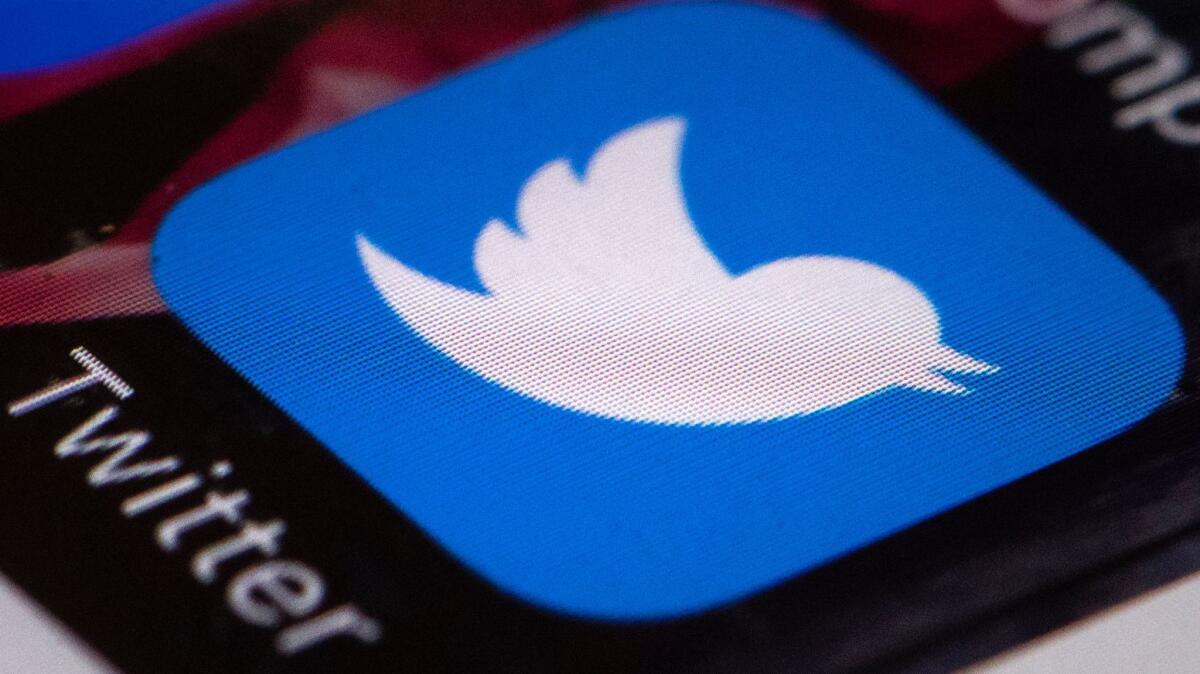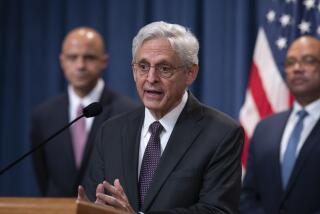Twitter finds 201 accounts linked to possible Russian interference during election

- Share via
Reporting from WASHINGTON — Twitter’s explanations of its actions against Russia-linked accounts are “deeply disappointing,” the Senate intelligence committee’s top Democrat said Thursday after a closed-door session with company executives, and he suggested the social media giant doesn’t understand the seriousness of Congress’ investigation into Russian election interference.
Sen. Mark Warner of Virginia said that the information Twitter shared with the committee’s staff “was frankly inadequate on almost every level.”
After meeting with staff of both the House and Senate intelligence committees, Twitter said it had taken action to suspend about two dozen accounts that were linked to fake Russia-tied Facebook accounts that were pushing divisive social and political issues during the 2016 U.S. presidential election.
The company said in a blog post that it found 22 accounts corresponding to about 450 Facebook accounts. The company said it also found an additional 179 related or linked accounts and took action on some of them that it found in violation of its rules.
Warner said that Twitter’s findings were merely “derivative” of Facebook’s work, and “showed an enormous lack of understanding from the Twitter team of how serious this issue is, the threat it poses to democratic institutions.”
He said the meeting underscored the need for the company to come forward in a public hearing. Both the House and Senate intelligence panels are inviting Twitter, Facebook and Google to testify this fall.
The committees have been investigating Russia’s interference in the election and any possible coordination with associates of Republican Donald Trump. They have specifically been looking at Twitter and Facebook and their roles in the spread of misinformation and propaganda during the campaign.
Thursday’s closed meetings lasted several hours. The company’s executives included Colin Crowell, a vice president of public policy, government and corporate philanthropy; Carlos Monje, director of public policy and philanthropy; attorney Elizabeth Banker, and Emily Horne, global policy communications director.
Twitter said it also provided congressional investigators with a “roundup” of ads from accounts used by Russia’s state-sponsored news network, RT. The company said in its blog post that RT spent $274,100 on ads targeted to markets in the U.S. during 2016. Twitter provided the ads, which came from three handles used by RT, to the congressional investigators. Most tweets from the accounts promoted news stories.
The top Democrat on the House intelligence panel, California Rep. Adam Schiff, showed less frustration after his own panel’s staff was briefed by Twitter, saying the meeting was “good but preliminary.”
“I think there are challenges to Twitter in its forensic investigation because Twitter users don’t provide the same background information that Facebook users do,” Schiff said. “At the same time I don’t think we’ve more than scratched the surface in terms of our understanding how the Russians may have used that platform.”
The committees are scrutinizing the spread of false news stories and propaganda on social media, to what extent Russia was involved and whether anyone in the United States helped target those stories.
Unlike Facebook, which has said phony accounts on its platform attempted to stir up divisiveness in the election, Twitter has remained mostly silent. Twitter allows users to register anonymously and has more public accounts than Facebook. Many lawmakers have expressed concerns about the proliferation of the anonymous “bots.”
Lawmakers have been interested in Twitter’s potential vulnerabilities in terms of tracing potential foreign intrusions. There have been concerns that the company doesn’t move quickly enough to remove posts and isn’t able to track the original postings that were spread and retweeted.
Twitter, Facebook and Google haven’t yet said whether they will accept the invitations to testify publicly before both intelligence panels. The House committee is planning a hearing in October and the Senate committee has invited witnesses to appear Nov. 1.
Congress so far has been reluctant to regulate social media companies. But Warner and Minnesota Sen. Amy Klobuchar started working on legislation after Facebook acknowledged in earlier briefings with the intelligence panels that the hundreds of phony Facebook accounts, probably run from Russia, spent about $100,000 on ads aimed at stirring up divisive issues such as gun control and race relations during the 2016 campaign.
Their bill would enhance transparency for online political ads and require social media companies to keep a public file of election ads and communications.
Facebook Chief Executive Mark Zuckerberg said last week that the company will provide congressional investigators with the contents of the 3,000 ads bought by a Russian agency, and he pledged to make political advertising on its platform more transparent.
ALSO
Mark Zuckerberg built Facebook into a behemoth whose power he underestimates
Facebook is trying to school users about spotting fake news
UPDATES:
5:30 p.m.: This article was updated with details following Twitter’s meetings with the House and Senate panels.
This article was originally published at 5:15 a.m.






